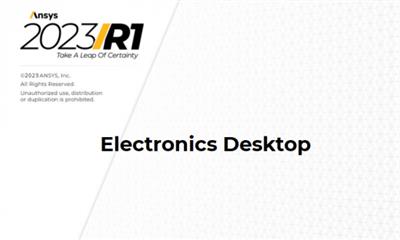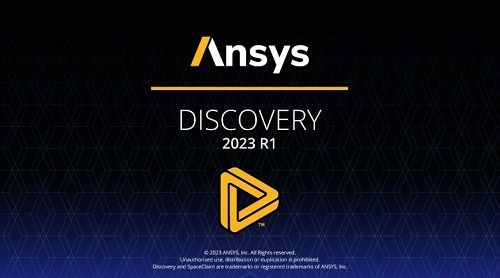
ANSYS Electronics Suite 2023 R1 with Local Help & PDF Documentation (Win x64)
Posted on 29 Dec 10:15 | by mata000 | 77 views

ANSYS Electronics Suite 2023 R1 with Local Help & PDF Documentation (x64) | 18.9 Gb
The software developer Ansys is pleased to announce the availability of Ansys Electronics 2023 R1. This solutions help you design innovative electrical and electronic products faster and more cost-effectively than ever before.
What's New in Ansys Electronics 2023 R1
New 3D Geometry Kernel
Electronics Desktop now uses the industry standard Parasolid geometry kernel.
General Electronics Desktop
- Ability to export images in non-graphical mode
- Multi-level distribution in large-scale distributed solves
- Batch option to select Intel MPI version
- Property scripting API enhancements
- Improved performance for refinement of large meshes
HFSS
- Support for modal ports and components in terminal designs
- Improved workflows for layout components
- Improved HPC performance for distributed mesh fusion solver
- Iterative solver option for mesh fusion
- Improved performance of domain solver for large arrays
- Option to set phase center at port location
- AMD math libraries with direct matrix solver
- Improved TDR calculation
- Parallel component adaptive for 3D Component arrays (Beta)
- Nonlinear Drude model for plasma density in implicit transient (Beta)
- SBR+ enhancements:
. Custom arrays
. Support for PTD/UTD in advanced doppler processing
. File-based near field
. Near field performance improvements
HFSS 3D Layout
- Etching workflow and robustness improvements
- Arbitrary backdrill depth
- Layout and ECAD usability and performance enhancements
- AMD math libraries with direct matrix solver
- Iterative solver option for mesh fusion
- Improved TDR calculation
- Solution management improvements
- IC Layout mode (Beta)
- Rigid flex multi-zone workflow (Beta)
- Support for wave ports in broadband frequency sweep (Beta)
SIwave
- HFSS region clipping and configuration enhancements
- Robustness improvements for CPA and PSI simulation modes
- Option to explicitly specify trace cross-section orientation
- Workflow and accuracy improvements for s-parameter components
- Signal Net Analyzer report export enhancements
- DCIR field post-processing enhancements
- Validation check performance improvements
- CPA package netlist remapping to fit any chip
- CPA package netlist simplification and resynthesis
- Ability to specify multiple ground nets for VRMs during CPA simulations
Icepak
- Slider bar and HDM meshing enhancements
- Graphical monitoring of batch solves
- Export of heat transfer coefficients in CTM v2
- Export of temperature data from multiple PCBs to Sherlock
- ECXML export
- Support for altitude effects
- Selection of 2D profile interpolation method
- New toolkits for snapping and heat sinks
- New Getting Started Guides: Finned Heat Sink, RF Amplifier, Optimization of Fan Location, and Cold Plate Model
- ROM Delphi support for BGAs (Beta)
- Support for direct post-processing of hybrid meshes (Beta)
Maxwell
- Windings in magnetostatic
- Force density calculation improvements
- Enhanced workflows for co-simulation with Motion
- Support for parallel branches in windings with solid conductors
- Half-axial symmetry for object-based harmonic force in transient
- Improved hp-assignment efficiency for complex geometries in eddy and magnetostatic
- ROM-based efficiency map for induction machines in the electric machine toolkit
- Electric machine toolkit workflow improvements
- Thin layer boundary for 3D DC conduction
- TDM support for different time steps between source and target
- Option to use Lorentz force calculation in 3D transient
- New design setting to skip mesh quality checks
- Band mapping angle meshing for 2D transient (Beta)
Mechanical
- Thermal contacts
- Reference temperature for objects in Structural
Q3D Extractor
- Performance improvements for E and H fields
- Infinite ground plane for CG
- Stability enforcement and passivity check for RLGC SPICE export
- Transition region solver for AC-RL (Beta)
- Distributed memory solver for CG (Beta)
Circuit
General Enhancements:
- Adaptive time-stepping for nonlinear simulations
- Tx/Rx support for IBIS-AMI models
- Virtual EMI test receiver component (Beta)
- Augmented-Data Passivity Enforcement for state-space fitting (Beta)
- Automatic tuning of HFSS 3D Layout ports in NuHertz (Beta)
SPISim:
- Ability to directly enable ERL calculation
- Workflow improvements for SERDES channel compliance
- Ability to specify Tx IBIS models and use slew rate in COM
EMIT
- Results and post-processing API
- Workflow usability enhancements
Twin Builder
Reduced Order Model:
- Linear Static ROM with support for large number of parameters
- Linear Dynamic ROM
- Image generation with geometry deformation for ROMs
Modelica Editor:
- Enhanced bijection (text-to-diagram) support
- Enhanced diagram graphics
General Enhancements:
- Support for Hierarchical parameters in the Model Parameter dialog box
- Model Exchange (ME) FMU support in Twin Deployer
- Support for gradient fitting in device characterization
- Carrier wave options in the SVPWM component
- Automatic pin connection for large components
Granta
Granta Materials Library:
- Ethylene glycol and propylene glycol records are updated with thermal expansion, density vs. temperature, viscosity vs. temperature and molecular data changes
- Missing molecular mass values are populated for all fluids
- Temperature dependent Young's modulus removed for Plastic, PA12 (rigid)
- Hc value removed for soft magnets
- There are no additional materials/records in the Materials Library in this release, but some property values are updated as a result of bug fixing
Granta Producer Materials Library:
- Added 8 new PCB laminates from two new producers: Arlon and Taconic
- Added 9 new PCB laminates for the existing producers: Rogers, EMC, Shengyi and Ventec
- Added 1 new polymer-elastomer material for the existing producer: Laird
- Gap filled some mechanical and thermal properties.
Selected Defect Corrections
Electronics Desktop
- 668753 – 2D rectangular plot scale now aligns with actual data.
- 697479 – Resolved negative time in some plots.
EMIT
- 653522 – Resolved EMIT Classic library import problem from 2022 R2.
- 668707 – Intermod equation is now correct for N-1 with multiple amplifiers.
HFSS
- 654756 – Slanted Co and Cross polarization now has corrected formulation.
- 685177 – Font options now correctly appear for Smith Chart.
- 692410 – VRT is now correct with multiple objects and penetrable materials.
HFSS 3D Layout
- 618343 – Fields now correctly plot on mesh fusion component.
Icepak
- 647899 – Conducting Plate Thermal Model with Shell Conduction and anisotropic thermal conductivity of Shell Conduction Zones works as intended.
- 655588 – Via Property Import for Classic Icepak model is now working correctly.
- 673227 – EM Loss visualization on PCBs is now working.
- 688342 – Face monitors can be correctly defined on fan components.
Maxwell
- 690031 – Transient/Harmonic Force Data Extraction calculates correctly when using If command in Time Step.
- 691114 – TransientForce_t() now returns correct data.
Mechanical
- 685199 – Specific designs that failed when "Mechanical Contacts" beta option was enabled now work correctly.
Q3D Extractor
- 685300 – Sink terminal name is now correct after Series matrix reduction.
SIwave
- 510943 – Improvements to PCB hole modeling during SIwave-Icepak thermal simulations.
- 658563 – SIwave validation check performance and robustness improvements.
- 701679 – Improvements to DS material model export fidelity from SIwave to HFSS and Q3D.
Twin Builder
- 663201 – Modelica IDE: Icon graphics from libraries are properly displayed now.
- 708978 – Duplicate library entries in Modelica path are now only loaded once
ANSYS Electromagnetic field simulation helps you design innovative electrical and electronic products faster and more cost-effectively. In today's world of high-performance electronics and advanced electrification systems, the effects of electromagnetic fields on circuits and systems cannot be ignored. ANSYS software can uniquely simulate electromagnetic performance across component, circuit and system design, and can evaluate temperature, vibration and other critical mechanical effects. This unmatched electromagnetic-centric design flow helps you achieve first-pass system design success for advanced communication systems, high-speed electronic devices, electromechanical components and power electronics systems.
Ansys Electronics Desktop is a comprehensive platform that enables electrical engineers to design and simulate various electrical, electronic and electromagnetic components, devices and systems. It is a unified interface which creates and analyzes electromagnetic (EM), thermal and circuit designs. Engineers can access gold-standard tools such as Ansys HFSS, Ansys Maxwell, Ansys Q3D Extractor and Ansys Icepak using electrical CAD (ECAD) and mechanical CAD (MCAD) workflows. In addition, the Electronics Desktop includes direct links to the full Ansys portfolio of thermal, fluid and mechanical solvers for comprehensive multiphysics analyses. Engineers can integrate rigorous 2D and 3D physics analyses with system and circuit simulations, all inside a single framework called Ansys Electronics Desktop. Any combination of products within the Electronics Desktop can be inserted into a single project. For instance, you can combine disparate design types such as HFSS, Circuit and Icepak into a single project. Schematics can be used to wire up different field solver models and create a model of a high-level system through dynamic links that combine 3D EM and SPICE circuit analyses. Engineers can efficiently manage complex projects that require several different analysis tools to predict the operation of their electronic products. Designs can also be parameterized. With Optimetrics, design variations can be studied and made available to other modules when the designs are included in a higher-level simulation. This allows engineers to conduct what-if experiments and study the effects of component design parameter variations on the behavior of the entire system.
In this webinar, you will get an introduction to ANSYS Electromagnetic Simulations. The webinar contains an overview of the low and high frequency tools, offered by ANSYS, for various applications.
Ansys is the global leader in engineering simulation. By offering the best and broadest portfolio of engineering simulation software, we help solve the most complex design challenges and create products limited only by imagination. Founded in 1970, Ansys is headquartered south of Pittsburgh, Pennsylvania, U.S.A.
Product: ANSYS Electronics Suite
Version: 2023 R1 with Local Help & PDF Documentation
Supported Architectures: x64
Languages Supported: english
System Requirements: Windows
Size: 18.9 Gb
Link Download
Download Via Fikper
Download Via Rapidgator
Extract files with WinRar 5 or Latest !
Related News
System Comment
Information
 Users of Visitor are not allowed to comment this publication.
Users of Visitor are not allowed to comment this publication.
Facebook Comment
Member Area
Top News

![ANSYS Electronics Suite 2022 R2 Win64 [2022, ENG]](https://i120.fastpic.org/big/2022/0707/dd/7601d335c67be27e462f96c14b73a6dd.jpg)

